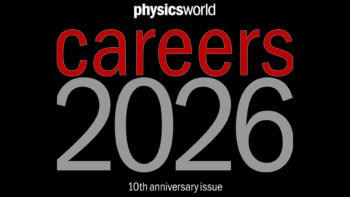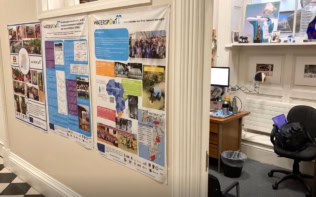With UNESCO's World Conference on Science set to debate the future of science and society later this month, Ray Mackintosh, Rezsö Lovas and Herwig Schopper discuss what UNESCO and physicists themselves could do to improve the standing of physics.
There is no doubt that the world has an increasingly intense love-hate relationship with science. Physics certainly does not escape this deep ambivalence, and we naturally wonder if there is anything that might make “them” love us a little more and hate us a little less? This question can be formulated seriously, and will be among the issues concerning science and its relations with society that will be addressed at the World Conference on Science in Budapest, Hungary, later this month. Most scientists will be represented in some way at the conference, since it is sponsored by both the United Nations Educational, Scientific and Cultural Organization (UNESCO) and the International Council for Science (ICSU), which represents national scientific bodies.
However, most world-weary physicists will see the conference, which will be attended by some 2000 delegates nominated by governments, non-governmental agencies and other organizations, as unlikely to make much difference. Nevertheless, the chance of actually influencing the governments of the world should not be passed up lightly. Indeed, the conference could prove to be influential, and there are plans for it to adopt two documents: World Declaration on Science and the Use of Scientific Knowledge and Science Agenda – Framework for Action.
So what can physicists add to the UNESCO discussions? In preparation, a workshop on “the future of physics and society” was held in Debrecen, Hungary, in March, attended by over 40 physicists from Europe and beyond. Many branches of physics were represented at the workshop, and a number of those attending had a specialist interest in physics education. A statement prepared at the workshop has now been forwarded to UNESCO, and the hope is that its recommendations will find their way into the conference’s two documents. Many other points, which are relevant to the wider physics community rather than the UNESCO conference itself, were also raised at the workshop.
Submission of hope
The document submitted to UNESCO begins with a three-point declaration. It states that:
- The contribution of physics to all aspects of life, material and non-material, will be essential for the foreseeable future;
- Physics currently faces serious problems in the world. Many of these problems affect science in general, but a number are specific to physics;
- Actions are needed to assure the continued health of physics research, teaching and cultural influence. Some form of “contract” between physicists and the rest of society will be required.
The first, positive point was supported by a range of arguments. Physical science was affirmed to be of immense cultural importance, not least as a bulwark against irrationality. And it was pointed out that physical science will make a vital contribution to solving environmental and energy problems in the coming century. There was also a feeling that the educational value of physics is immense, and that this value is widely under-appreciated. (An interesting fact that emerged at the workshop was that trained physicists have won Nobel prizes in all categories – physics, chemistry, medicine (Allan Cormack and Godfrey Hounsfield), peace (Joseph Rotblat), economics (Robert Merton) and literature (Alexander Solzhenitsyn).)
Before turning to the problems that physics faces with the world, let us mention some of the actions that the workshop recommended in the third point, concerning the support for physics and physics education. The statement calls for UNESCO to “explore ways of establishing a recognized authoritative and impartial international body, set up under the auspices of UN or UNESCO, to adjudicate damaging disputes involving scientific issues”. This new body would investigate the extent to which claims are based on established science or are simply ungrounded opinion, perhaps influenced by pressure groups. It would therefore provide an authoritative scientific basis for important political decisions.
The “cold fusion” affair of the late 1980s is an example of the sort of dispute that such a body could tackle. But there are also serious scientific issues, many relating to the environment, that such a body could tackle. For example, the question of whether the controversial Gab�cikovo-Nagymaros dam on the River Danube between Slovakia and Hungary should be built involves disputed scientific issues. These could, and should, be disentangled from the political issues and be settled by an independent body.
Two very positive findings also emerged at the workshop, and we must learn to exploit these. The first is the high national prestige that flows from scientific achievement. Only sporting accomplishments, it was felt, are rated as highly. Indeed, this scientific prestige is beginning to be exploited in international negotiations at the highest level. The other positive development is the burgeoning public thirst for popular science. Never have there been as many popular-science books, and the increasing public interest is certainly something we must build on. Many speakers also emphasized our responsibility to communicate with the public and professionalize the way we do so. But there is a downside to scientific publicity – too often the media, and sometimes even scientists, behave irresponsibly.
Physics and the public
Not all the views expressed at the workshop were positive. Some of the problems faced by physics arise from the public’s increasing “anti-science” feelings and their seemingly growing irrationality. While the character of such sentiments varies from country to country, there are common features, such as the fashion for politicians to make decisions on advice from their astrologers. We also heard rumours that the Ukrainian “mafia” have cornered the market for quack medicines in a certain east European country; we feel that the belief in such products embodies an outright rejection of science. Although these examples might not seem to have much to do with physics, they affect all of science.
But physics itself does seem particularly malign in the eyes of many people. These feelings go deep. There is, for example, a profound fear of radioactivity, based on misconceptions, of course, which seems to provide a focus for the alienation. Science, including physical science, is seen to be “reductive” and “cold”, and it is felt to have eliminated meaning from human life. Particularly worrying developments in anti-science include the growing belief that imagined conspiracies, both malign and covert, control the media – for example, to deceive us about the truth about unidentified flying objects or alien abductions. Recent debates in biological science, such as the issue of genetically modified food, have highlighted the public’s deeply confused attitude to authority. In such cases people are not sure whether to believe the scientific establishment, which is seen to be in the pocket of multinational companies, or a particular pressure group, whose Web site seems to offer all the right answers.
This problem of how the public sees science is inseparable from related tendencies in academia and the wider intellectual world, where, in certain quarters, science is not accepted as producing “truths” about the world. It is ironic that this growth of “relativism” has apparently been nurtured by misinterpreted physics – self-indulgent popularizers please note! How, for example, has Heisenberg’s uncertainty principle, interpreted as “everything is uncertain”, gained such widespread and damaging currency? And how did Einstein’s theory of relativity ever come to give aid and comfort to relativism? The gut feelings of most working physicists against extreme cultural relativism is enshrined in our statement for the UNESCO conference, where we state that: “physics is global and constitutes our best ‘anti-Babel’. Generations of physicists of the most diverse political and cultural backgrounds have collaborated on the basis of shared understanding and shared ideals”.
But one contributor at the workshop suggested that some physicists have gone too far in their blanket criticism of post-modern writings. Maybe physicists have not done justice to the context and form of the discourse of some of the statements that they have criticized. Out of these thoughts, and through the realization that the world outside science is not monolithic, arose a new idea that physicists should try to reach a rapprochement with at least part of the world of sociology. In particular, we should enlist their expert aid in analysing some of the problems faced by physics in its relations with the world. We urge the UNESCO conference to consider this suggestion.
Economics and education
What UNESCO might do for science or physics remains to be seen, although we hope that it comes forward with measures that will be helpful in particular countries. We recommend, for example, that UNESCO should establish a committee that can advise on national science policies and can set up guidelines linking a country’s expenditure on research and development to its gross national product, at a level appropriate to the economic state of that particular country. Such guidelines would certainly help the science communities of the “new democracies” of eastern Europe. They would also benefit if they could point to an affirmation by the World Conference of the importance of both basic physical science and curiosity-led research.
UNESCO might also do something for physics education, which is a matter of concern in both affluent and less affluent countries, albeit in different ways. The fact that so many members of the public – even in wealthy countries – seem quite unable to make sound judgements about things such as alien abductions suggests that the veneer of scientific understanding is thin indeed. This is a serious point, since this ignorance seems to go hand in hand with extreme distrust in authorities.
To what extent is this a failure of education? The workshop heard examples from many nations of a whole range of problems in physics education, especially at the secondary level. In many countries, it seems, physics education has simply failed. Common problems are outdated educational policies, and a lack of financial and political support for the subject. Another theme is the lack of response of science teaching to the changing social and scientific environment. We heard eloquent pleas at the workshop for the introduction of more exciting and relevant topics, such as cosmology, the environment, radioactivity and energy, into the physics curriculum.
Get set for Budapest
So what could UNESCO do? We have put forward recommendations to set standards on the content and practice of physics education. It would be of immense help to governments and national organizations of physics teachers if the World Conference adopted these recommendations. Teachers and others would then have standards and norms – rising above the politics of their own country – to which they could refer. UNESCO must also establish and make available the data that would make it possible to monitor and defend these standards.
It is up to us physicists to improve our relationship with society. Our recommendations therefore involve our relations with the public, with other physicists, with government, with other academic disciplines and with educational establishments. It is essential that we ourselves understand the social roots of the current situation. We must also be careful not to provide opportunities for those who would divide and rule.



